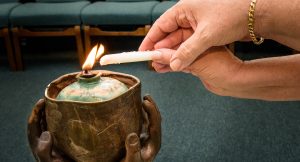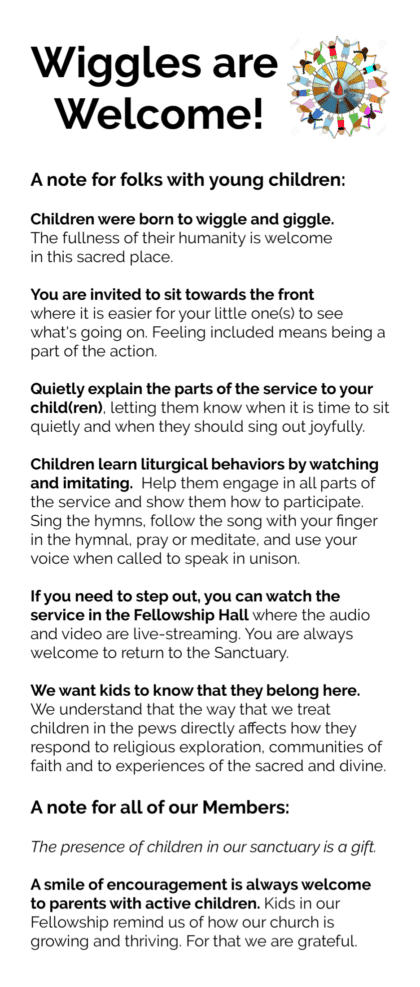UUFA Sunday worship follows many of the patterns of our Protestant roots (hymn singing, prayers or meditation, a sermon, a children’s story) and yet allows for many new ideas to break forth. The minister might quote Hebrew or Christian scripture, read a poem by Mary Oliver or a passage by James Baldwin, or share wisdom from the world’s religions. Additionally, we honor the gifts of our lay members by having at least one lay-led service each month.
Our music is sometimes spirited, sometimes reflective, and almost always accompanied by our house band (featuring talented jazz pianist Neil Golden) and led by UUFA Music Director Amber Fetner.
We welcome children in worship. You’ll find crayons, coloring sheets, and fidget toys right inside the sanctuary door (and yes, all ages are welcome to use them). There’s a Time for All Ages (usually a story told by the minister or Director of Religious Exploration), and children are welcome to stay for the whole service or to go to their classes after the story.
Whether they’re in the sanctuary during the multigenerational time or for the whole service, be assured that “Wiggles are welcome!”
Assisted listening devices are always available from the ushers. A Braille hymnal and an ASL interpreter can be made available with advanced notice. Please contact the office (706-546-7914, ext. 5).
Casual clothes usually predominate though some folks like to don their “Sunday best” and find just as warm a welcome. And whether we’re online or in person, we like to linger for a time of Fellowship. Coffee or tea and a light snack are offered to help create an atmosphere of conviviality and conversation.
Today you’ll see images of the “flaming chalice” in everything from stained glass to tattoos. UUFA has a beautiful, sculptural chalice with a central oil lamp, and we light it early in worship each week. Worship starts at 10:30 a.m.
Our services usually follow a pattern that reflects our roots in American Protestantism. We sing hymns, hear a story, often meditate on or pray for the joys and sorrows of the world and our congregation. There’s usually a sermon by the minister, and sometimes lay people speak from their hearts instead.

Children of all ages are always welcome in worship.
Some people like to wear their Sunday best, and others prefer jeans or shorts and sandals. Please dress in whatever feels comfortable and helps you feel authentically you.
Sunday services last roughly an hour, though a particular service may be slightly shorter or longer. We aim to start on time, at 10:30 am.
Yes! As people who learn from and love many religious traditions, we celebrate many holidays and holy days throughout the year. Our ingathering service at the end of summer includes a Unitarian Universalist Water Communion in which we pour water into a common bowl to “reconstitute the community” for the new Church year.
We have a century-long tradition of a Flower Communion in the spring, too. There’s always a deeply moving musical service to celebrate Winter Solstice, and a candlelight Christmas Eve service with some traditional carols and a few new ones. On Easter we interpret the “old, old story” from a fresh point of view.
Throughout the year we celebrate holidays from Jewish, Buddhist, Hindu and other religious traditions, as well as cultural holidays such as the Rev. Dr. Martin Luther King Jr.’s birthday, Earth Day, Veterans Day, and so on.
The word “worship” literally means “to lift up things of worth.” Because we don’t have a creed (a set of beliefs which all members must accept), we lift up what is most important to us—our shared values. Together we seek answers to life’s most difficult questions, learn how to be better people, remind ourselves of our highest aspirations, and learn from each other and from various faith traditions. We do not collectively worship God though some Unitarian Universalists do. When we’re together, we respect and incorporate a variety of ideas and names for The Holy Mystery.
If you have other questions or concerns about worship at UUFA, please contact the minister. We look forward to seeing you in worship and hearing from you, too.
